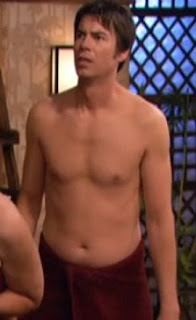 18-year old Jake T. Austin was formerly the gay-vague wizard Max on Wizards of Waverly Place, and is now starring in ABC Family's The Fosters, about a family with two Moms. He also has upcoming movies playing Huckleberry Finn and a misfit zebra named Khumba. He's never made any public statements about his sexual identity, but he's seen with guys all the time, and the rumor mill has linked him romantically with nearly every teen hunk he's ever met. Most aren't gay, and some don't have any gay connection at all.
18-year old Jake T. Austin was formerly the gay-vague wizard Max on Wizards of Waverly Place, and is now starring in ABC Family's The Fosters, about a family with two Moms. He also has upcoming movies playing Huckleberry Finn and a misfit zebra named Khumba. He's never made any public statements about his sexual identity, but he's seen with guys all the time, and the rumor mill has linked him romantically with nearly every teen hunk he's ever met. Most aren't gay, and some don't have any gay connection at all.1. Christian Fortune, who has appeared in some Disney Channel teencoms and shorts, and will star in the upcoming buddy-bonding horror movie Youngville (2013). He and Jake are doing a webseries together, The Adventures of Sebastian, about a nerd (Jake in glasses) and his cool brother (Christian). No gay connection.
2. Moises Arias, previously the villainous Rico on Hannah Montana and Sue's wrestler boyfriend on The Middle. He played Max's conscious on Wizards. Gay connection: buddy-bonding on Hannah Montana, and Biaggio, the "person without a gender" who thinks he's gay in The Kings of Summer (2013). (Nothing yet on Moises' brother Mateo).
3. Ryan Ochoa from The Perfect Game, plus recurring roles on Nickelodeon and Disney Channel teencoms, a member of the boy band The Ochoa Boyz. On my list of Unexpected Disney Channel Teen Hunks. He and Jake are seen together often in real life. Androgynous.
4. Gabe Morales (left), from The Perfect Game. Primarily a dancer, he starred in the 2013 comedy In Security with Ethan Embry. Gay connection: well, he's a dancer.
5. Cole Sprouse, who starred in the Disney Channel's Suite Life of Zack and Cody and Suite Life on Deck (pictured: his twin brother Dylan). He's currently attending NYU, studying archaeology. Gay connection: two subtext series.
6. Jansen Panettiere, who also played a kid with two moms. Another of Jake's frequent companions. They have collaborated on a webseries called Tales of the Closet.
7.Gregg Sulkin, who played Alex's werewolf boyfriend on Wizards, and the object of Max's gay-subtext crush. Gay connection: the gay-themed movie White Frog (2013).
8. Adam Irigoyen, who plays Deuce Martinez on Shake It Up. Gay connection: subtext series.
9. David Henrie, Max's older brother Justin on Wizards of Waverly Place, who will be appearing in Grownups 2 later this year. Gay connection: actually, he appears to be homophobic in real life.
So, which ones has Jake really dated?
Best bets: Christian and Ryan, but probably none. He tweets quite often about the attractiveness of ladies, so he's probably Straight but Not Narrow, with both gay and heterosexual buds in his posse.


































